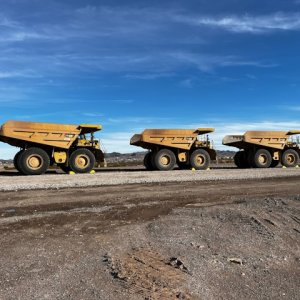Demonization of Mining a Key Issue for Industry: VHG Abogados

STORY INLINE POST
(Important Note from VHG Servicios Legales:
A few days after the following interview took place, the mining industry was shaken by a proposal of amendment to the Mining Law, summited by President Andres Manuel Lopez Obrador to the Federal Congress.
Despite all irregularities and the unconstitutionality of most articles in which the amendment is being proposed, this proposal is creating more uncertainty as to the future of the mining industry.
VHG considers this proposal to have political interests and in no way whatsoever is it looking to improve this important industry. It also affects the human rights of ejidos, agrarian and Indigenous communities in Mexico.
At this moment, VHG is studying all the related issues in order to determine the best steps that may be followed should this proposal be accepted by Congress and published in the Federal Official Gazette (DOF); for the moment, VHG is of the opinion that the Industry is facing one of its most difficult moments, investors are of course worried; however, there are many ways to suspend such amendments if proper steps are followed.
Unlike other firms, VHG is now suggesting that mining concessionaires:
- Make sure they are current and complying with all of their obligations;
-
Request, if possible, certifications on the validity of their concessions;
-
File any mining application under the current Mining Law (if there is any free land of their interest);
-
Close any transaction they may be negotiating and file the same for registration with the Public Registry of Mining.
-
Waive any amparo they could have filed looking to obtain the issuance of titles of mining concession under any application filed under the current Law.
At this moment, rather than “describing” the potential damages this proposal would create if approved and published, VGH is focused on how to protect projects and concessions in place, making sure to, if approved, defend any act of authority that could try to apply the amendments in a retroactive manner, affecting the interests of current concessions and concessionaires.)
Q: What main legal issues in the mining industry is VHG addressing?
A: Subject to note by the end of this interview, the main issues in the industry are not legal; they are related to communication and the socio-political environment. The legislation is still the same and, despite every law being susceptible to change, it is not bad legislation. The main issue here is the erroneous application of the law and, of course, the fact that we are still lacking a legal framework for Indigenous consultation.
Regarding communication and social issues, the mining sector lacks appropriate image management. We are facing a difficult federal administration but it also opens an area of opportunity for the sector to look introspectively and determine how to move forward; for example, in terms of sustainability. The mining sector has never denied its environmental impact but that does not mean that it is not working to make its operations more sustainable. The main problem here is the demonization of the sector, which is a narrative around the mining industry’s impact that has been pushed by antimining groups. These groups sometimes even launch attacks based on lies. In this sense, the mining sector could improve its communication skills to demonstrate what it is doing to address this important issue.
I consider the mining industry to be among the cleanest sectors since all the products obtained are 100% recyclable. It's like a coin; if you find it, you don't leave it on the ground.
Q: What impact will the Mining Law reform have on the industry, particularly in terms of lithium mining?
A: The Mining Law reform will certainly provoke uncertainty. Of course, lithium will be an essential mineral for the energy transition and its exploitation is crucial. However, the process to harness this mineral was implemented incorrectly; there was no need to modify the Mining Law. Before the reform, the Mining Law already established the possibility of creating mining reserves for strategic minerals. This process has always existed but requires coordination between the authorities and the Mexican Geological Survey (SGM). Now, President Andrés Manuel López Obrador has declared lithium a strategic mineral without even confirming its existence, and based solely on the possibility of its existence. This sends a message to the sector that if the government does not find lithium tomorrow, it could declare any other mineral as strategic, creating uncertainty.
Following the previously established procedures would have ensured that the government receives the best economic conditions and that the best techniques for exploitation are implemented. By creating the new state-owned company LitioMx without the certainty of lithium's existence, the government has demonstrated that it is not concerned about the best interests of society.
Q: Minister of Economy Raquel Buenrostro has accused the mining sector of corruption and not paying taxes. What are your views regarding her statement?
A: Firstly, a public officer has the obligation to apply the law and should not use their position to engage in activism. Buenrostro’s statement is a serious allegation that requires supporting evidence to back it up. While it is true that some mining companies have been accused of violating some rules or not complying with tax obligations, these allegations should be investigated and prosecuted individually, not generalized to the entire sector.
It is important to note that the mining industry has specific regulations and requirements that it must comply with, including environmental regulations, labor laws and tax obligations. Furthermore, the mining sector is a capital-intensive industry; for instance, a preoperative phase in the mining sector could last at least 15 years. Often, this stage is fueled only by investors’ money and without a clear certainty to obtain a profit. It is a high-risk industry. That said, the exploration and exploitation activities should not be subject to the same tax obligations. Additionally, mining exploitation activities are subject to a 7.5-8% tax as a mining royalty, which recently has been redirected from its original destination — the municipalities or states — and now goes directly to the federal government. Therefore, saying that the mining industry does not pay taxes is unfounded.
Q: How can law firms like VHG help clients with their relationships with communities?
A: We are very passionate about this matter. VHG has helped clients by carrying out studies to identify the community leaders or authorities and initiating contact and building transparent relationships with them. These relationships are also known as “secondary relationships.” This is very important because the very first time you enter a superficial area, you must get in touch with the land owner, which is often a community. When we enter a community, we recognize that the inhabitants are looking for job opportunities, not necessarily direct jobs. It is well known that for every direct job a mining company creates, it also creates two or three indirect jobs. What the mining sector has been working on for several years is developing productive activities that can even cover the mining site’s needs, since they often require services like cafeteria or maintenance services. VHG has successfully helped communities in the creation of such companies and with their subsequent requirements and needs.
Q: What trends have emerged for the mining industry in 2023?
A: Trends are not set to go in the right direction. As long as already established mining companies are still producing, there will be production because their minerals are highly demanded by the industry. However, in the case of exploration, I believe that companies will prefer to save their resources or take them somewhere else until after the result of the presidential election in 2024.
In this sense, the closer we get to the elections, the more we will see attacks on the mining sector. This happens every six years: the candidate that needs votes at some point will attack the mining sector to gain popularity. It is the easiest way to find a scapegoat.
Mexico is still an attractive country in terms of mineral reserves but if you have a government that openly admits that it will not authorize new projects, concessions or permits and that it will not offer legal certainty, it offsets the attractiveness of the country. Furthermore, we have noticed an increase in security concerns due to organized crime organizations. Companies are not just risking money but also their workers’ lives.
In a nutshell, I would say that 2023 will be a difficult year due to the constant attacks coming from the government. However, I also believe this challenging situation can be an opportunity for companies to reflect internally and identify areas of opportunity. Companies can use this period to improve themselves and demonstrate that they are not what they are being accused of.








 By Fernando Mares | Journalist & Industry Analyst -
Tue, 04/11/2023 - 12:41
By Fernando Mares | Journalist & Industry Analyst -
Tue, 04/11/2023 - 12:41
















